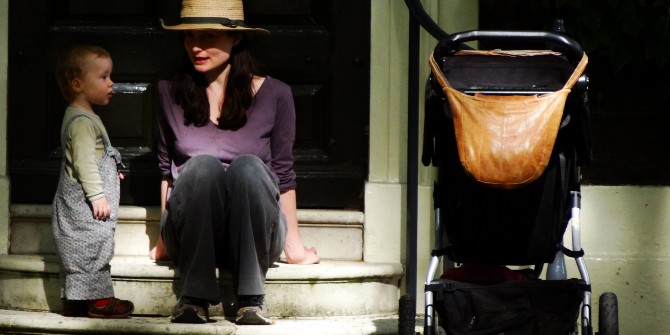The pandemic has thrown many women out of paid work and forced them to take on caring responsibilities. Shani Orgad (LSE) says that until prevailing cultural narratives change, women will continue to blame themselves for the ‘choices’ foisted upon them by an unequal society.
Shani Orgad is responding to Aliya Rao’s LSE Festival lecture, Why is Unemployment Bad for Gender Equality?. Join in the discussion below.
Unemployment has often been seen as an opportunity to ‘reset’ gender inequality in the home. Amongst heterosexual couples with children, a man’s unemployment can be an opportunity to become more equally involved in the work of social reproduction – caring for children and maintaining the home – unpaid work that is disproportionately performed by women.
Yet in her research on heterosexual couples where either the man or the woman have been unemployed, Rao found that the opposite was true. Rather than a jumpstart for gender equality, unemployment cements and even expands inequality. One of the critical questions Rao’s research raises is why, in such a moment of disruption, when the man or the woman lose their job, couples seem to fall back into patterns that preserve and deepen traditional divisions of labour?
Part of the answer lies in what Rao observes: for men, unemployment is framed as a problem that needs to be rectified urgently; it necessitates spending time on looking for a new job. For women, by contrast, unemployment generates an expectation to carry out even more unpaid labour in the home. In other words, individuals’ most intimate decisions about the conduct of their family life, relationships and work, are profoundly shaped by gendered norms and dominant cultural scripts.
In my own study of women who left paid employment (often in successful and high-paid jobs) after having children, I found that their decision to leave, which is often constructed as a private and personal choice, was neither free nor entirely personal. Rather, it was shaped by a combination of factors, including work structures and cultures that are utterly incompatible with family life, the lack of suitable and sustained childcare support, and crucially, stubborn social perceptions and cultural narratives about gender, work, and family.

Like some of the women Rao interviewed, some of my interviewees had also earned more than their male partners before leaving paid employment. Yet contrary to the economic logic, which would suggest that it is the man who should leave their job, it was women who did. The heteronormative cultural story of motherhood – that mothers are the ‘natural’ foundation parent who ought to care for the children and the family and that men are the ‘natural’ breadwinners – prevailed over any economic rationale.
Indeed, cultural, media and policy narratives provide an enormously powerful framework for people’s sense making of decisions related to work and family. The women I interviewed often judged themselves, as did family, friends, employers, and co-workers, through and against these cultural narratives. “I was never very ambitious,” Susan told me, yet she was a woman who had studied for many years, practiced medicine and planned to become a clinical geneticist. When I met Susan, she had left her employment in deference to her husband’s demanding job in the financial sector. Rather than questioning the unequal division of labour in the home and the structural conditions of her workplace that forced her out of employment, Susan had internalised the popular mantra of women suffering from an ‘ambition gap’, and painfully blamed herself for her failure to pursue the career that she had so desired.
COVID-19 now presents another moment of profound rupture, which could, as many have hoped, significantly ‘reset’ gender inequality. Given that many men and women have been forced to work from home, so the argument goes, the work of social reproduction can now be distributed more equally. Now that more people work from home, workplace norms will shift, prioritising quality and results over presence, whilst allowing both men and women to participate in family life in a more meaningful and equal way.
Yet for this promise to be even partially realised, the structural conditions of inequality must be addressed, and alternative conditions created. Access to affordable childcare, as Rao mentions, is one of these urgent conditions. Another, as I have highlighted, concerns the cultural narratives that often intangibly yet powerfully shape women’s and men’s personal lives. One of the central cultural narratives that needs to be taken to task, as shown by both Rao’s and my own research, is the one that celebrates very narrow notions of economic ‘productivity’ and valorises working around the clock. Instead, a narrative that places care and its value at the heart of politics – an urgent issue that the pandemic has thrown into sharp relief – would at the very least encourage and authorise more egalitarian relationships and a more equal society.
This post represents the views of the author and not those of the COVID-19 blog, nor LSE. Watch Aliya Rao talking about gender and unemployment and add your own comment below.





